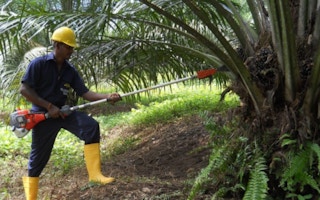Environmentalists have welcomed the Sri Lankan government’s surprise decision to ban palm oil imports into the country and raze existing plantations, but others say the science justifying the move is unfounded.
The government made the announcement in an April 5 gazette, citing recommendations from an expert panel formed by the Central Environmental Authority (CEA). The panel had identified soil erosion and drying of springs as among the potentially irreversible impacts of oil palm plantations on the island’s biodiversity and livelihood of local communities. Its report, published in 2018, outlined several recommendations to create the foundation for banning oil palm cultivation on the island.
Gamini Hitinayake, a member of the expert panel and professor in the Faculty of Agriculture at the University of Peradeniya, said the proliferation of oil palms threatened native plant and animal species.
“Oil palm is a threat to the existence of all traditional plantation crops such as rubber, tea and coconut which are far more environment friendly,” he told Mongabay.
Invasive species
Siril Wijesundara, former director general of the Department of Botanical Gardens and a member of a team documenting invasive alien plant species in Sri Lanka, said oil palms have been found growing naturally in the Indikada Mukalana forest reserve in the country’s west.
“Oil palm already shows signs of becoming an invasive species in Sri Lanka,” he told Mongabay. “As a precautionary measure to prevent oil palm becoming an invasive [species], it is important to prevent natural regeneration of oil palm seeds within and adjacent [to] oil palm plantations.”
Introduced to Sri Lanka in 1968, the African oil palm (Elaeis guineensis) doesn’t have a natural pollinator here. So the African oil palm weevil (Elaeidobius kamerunicus) was also brought into the country. While there are no documented reports of negative impacts associated with the beetle, more research needs to be done on it, said Jayantha Wijesinghe of the local environmental NGO Rainforest Protectors of Sri Lanka.
Water worries
Hitinayake said another of the main concerns regarding oil palm cultivation is that the tree absorbs a lot of water, leading to fears that it could dry up local streams. Oil palm is a fast-growing plant, and as such has a high rate of water consumption, especially during the growth stage, Hitinayake said.
Another issue the expert panel report highlighted was that oil palm plantations don’t have intercropping or undergrowth; they’re strictly monoculture, and so don’t support biodiversity. In contrast, the more common rubber plantations do support a relatively high level of biodiversity. Recent research shows endangered Indian pangolins (Manis crassicaudata) prefer rubber plantations as their prime habitat, after forests.
But rubber plantations have disappeared to make way for oil palms since the latter were first introduced here. Unlike in most of the other countries where oil palm is grown, notably top producers Indonesia and Malaysia, the crop’s commercial cultivation hasn’t driven large-scale deforestation in Sri Lanka. Instead, it has taken over rubber plantations, aided by tax concessions for seed imports and other incentives from the government.
That’s given rise to another complaint, this one about the social impact of oil palm plantations. Cultivating and harvesting the crop isn’t as labor-intensive as rubber or other crops, prompting fears and protests from villagers working in rubber plantations about a loss of livelihood.
Planting violations
There are about 11,000 hectares (27,000 acres) of oil palms planted across Sri Lanka. “But in many instances, the planters violate basic guidelines issued for cultivation,” Wijesinghe said.
He noted that it’s prohibited to plant oil palms on slopes steeper than 30 degrees, but in some places, they’re cultivated on slopes steeper than 60 degrees. There’s also a prohibition on planting in wetlands or on riverbanks, but this too is often breached, Wijesinghe said.
Under the government’s new stance on palm oil, all imports will be banned. The country buys about 200,000 metric tonnes of the vegetable oil annually, mostly from Malaysia. The new policy also calls for razing 10 per cent of oil palm planted area every year and replanting with rubber and other crops that are less water-intensive.
This story was published with permission from Mongabay.com.










